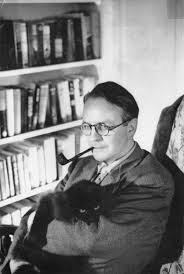Riddles have been with us throughout our recorded history, and probably into our pre-history.
There’s something about the challenge of riddles and puzzles that draws us. Perhaps it’s like any other game: we want to be a winner.
In the world of literature, the traditional mystery, the mystery that began with Poe’s C. Auguste Dupin, became popular with Sherlock Holmes, and entered its Golden Age in the 1930s, is at base a riddle — a puzzle that demands to be solved.
Some of the finest examples are those penned by Agatha Christie. But other excellent mystery writers were Patricia Wentworth, Ngaio Marsh, Margery Allingham, Phoebe Atwood Taylor, Rex Stout, S.S. Van Dine, Jacques Futrelle, Edmund Crispin, Erle Stanley Gardner, and Ellery Queen.
The traditional mystery is a game, as it were, between the author and his/her readers. The author must play fair by giving all of the clues to the reader so that he or she has the chance to figure out whodunit before the detective makes the great reveal at the end of the book.
This game aspect of the classic mystery story pushes it into the realm of fantasy. The classic mystery is, in fact, guilty of Raymond Chandler’s accusation that it isn’t real, or true to life. I’d argue that it was never intended to be true to life.
The traditional detective story is a literary game. It is not meant to be a slice of life. Its purpose is not to expose us to the mean streets and the sordid folk who populate them. The classic mystery is not about the people who really commit murder.
The classic detective novel is a game of Clue in book form. Nothing more, and nothing less. It’s a game, pure and simple. And as such, it is great fun.
Sad to say, the traditional mystery has been on the decline since the 1940s, when, first, the hardboiled novel and then the thriller pushed the classic detective story into the backwater of crime fiction.
And while the number of mystery aficionados continues to dwindle, I have to say that the older I get the more I prefer the mystery to any other genre.
There is something about its simplicity, its gentler pacing, its eccentric characters, and the formulaic settings that I like. After all, the world is too often mean, nasty, and brutish — why do I want my entertainment to also be that way? Isn’t the nightly news enough?
And isn’t life hectic enough? Why do I want my fiction to also proceed at a breakneck pace? Well, I don’t. Which is why I prefer the gentler and more natural pacing of the classic mystery novel.
For me, fiction is a ticket to another world. A world where I can vicariously experience triumph and victory through the exploits of the main character. I read to be entertained. I don’t want a rehash of the nightly news. I read to escape my world. I don’t want my books to put me back into what I’m trying to leave.
Fiction is for fun. And perhaps that is why I so very much enjoy the classic detective mystery: it is first and foremost entertainment. No different than a game of Scrabble, or Clue, or a crossword puzzle, or a riddle. It is a fantasy dressed up in a pseudo-reality. A world that we perhaps wish were our own.
The classic detective mystery is not meant to mimic real life. It’s meant to be a challengingly fun bit of diverting entertainment. And the best mysteries most assuredly are.
Comments are always welcome. And until next time, happy reading!
 CW Hawes is a playwright, award-winning poet, and a fictioneer; as well as an armchair philosopher, political theorist, and social commentator. He loves a good cup of tea and agrees that everything’s better with pizza.
CW Hawes is a playwright, award-winning poet, and a fictioneer; as well as an armchair philosopher, political theorist, and social commentator. He loves a good cup of tea and agrees that everything’s better with pizza.
